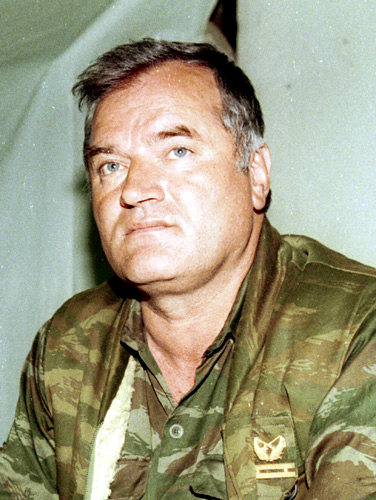The Butcher of Bosnia's End Game | Ratko Mladić
/Ayanna Nahmias, Editor-in-ChiefLast Modified: 19:07 PM EDT, 12 July 2012
THE HAGUE, Netherlands — Former Bosnian Serb military chief Ratko Mladić has once again found a way to delay his trial in which he has been charged with 11 counts of genocide, war crimes and crimes against humanity for the 1995 Srebrenica massacre of 8,000 Bosnian Muslims.
Upon the conclusion of his current adjudication, he is scheduled to be tried for ordering other Serbian atrocities throughout Bosnia’s 1992-95 war that left 100,000 dead.
On 12 June 2012, Mladić was rushed from The Hague courtroom to a hospital after complaining of feeling unwell. After several delays the first witnesses just began to testify this week in against the 70-year-old former general, which makes his sudden illness suspicious and to outward appearances cowardly.
Apparently, the Butcher of Bosnia had the stomach to order his troops to commit mass murder while he watched, but seems unable to face the verbal accusations of his accusers. Though he was sent to the hospital as a precautionary measure, the accommodations that he has and is yet receiving does not seem warranted given the heinous nature of his crimes, especially since his victims were not afforded the luxury of having their executions delayed.
Presiding Judge Alphon Orie suspended the trial and called for a medic after Mladić held his head down and ran his hands through his hair while complaining of feeling ill. Remarkably, he was able to “compose himself” as he was taken from the court to the hospital for tests.
Mladić evaded capture for 16 years until his arrest in Serbia last year. He has since undergone minor surgery for a hernia and has suffered from other ailments such as kidney stones and pneumonia which are common given his advanced age.
The reticence of the court to continue with the proceedings because of Mladić’s claims of illness is understandable given its prior experience in the trial of Former Yugoslav President Slobodan Milosevic who died of a heart attack in his cell in 2006. His death resulted in a premature end to his genocide case.
However, justice and closure for Mladić's victims is far more pressing and should be given equal weight when deciding to postpone his trial yet again. If even a hint of subterfuge on his part is suspected, and though it is politically incorrect, sometimes death during due process can bring a sense of closure that delayed justice cannot.
Related articles
Remembering the dead of Srebrenica (telegraph.co.uk)
War crimes trial of Ratko Mladic adjourned after Serbian military chief falls ill in courtroom (dailymail.co.uk)
War crimes trial adjourned as Ratko Mladic is taken to hospital (guardian.co.uk)
Ratko Mladic Hospitalized After Feeling Unwell (nytimes.com)















